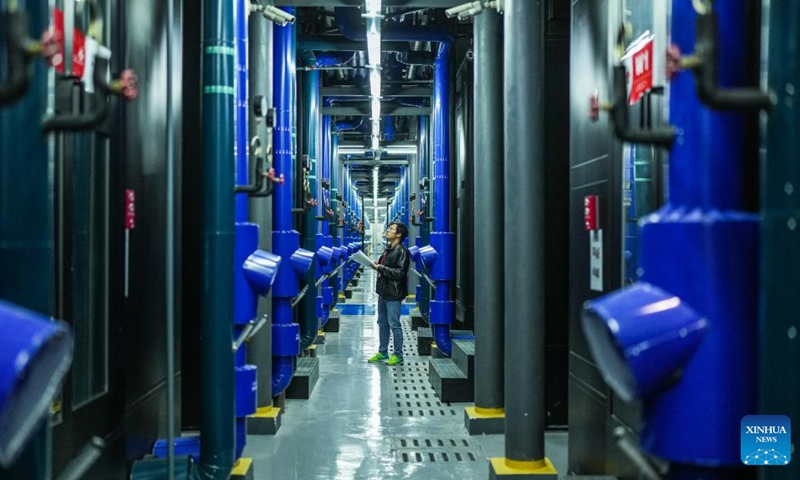
A staff member inspects the operating status of the micro module room in Guian Data Center of China Unicom in Guian New Area, southwest China's Guizhou Province, on May 23, 2023. In February 2022, China started work on the project to build an integrated national big data system involving the establishment of eight national computing hubs and 10 national data center clusters.(Photo: Xinhua)
China is rolling out new policies to promote high-quality development of computing power technology on Monday, aided with strengthened top-level design and infrastructure build-up to give the country an edge in complex computations and data processing tasks.
Six government agencies including the Ministry of Industry and Information Technology (MIIT), the Office of the Central Cyberspace Affairs of Commission and the People's Bank of China have recently released an action plan to promote the high-quality development of the country's computing power technology.
The action plan noted that the country's total computing power will reach 300 EFLOPS as of 2025, with intelligent computing power accounting for 35 percent of the total, while eastern and western regions achieving balanced and coordinated development.
EFLOPS is a unit of the speed of computer systems. It equals to one quintillion floating-point operations per second.
Computing power refers to the ability to process complex data. It includes information infrastructure and technologies to support information computing power, data storage and network capacity.
In terms of data storage and network capacity, relevant authorities set the goal that the country's total storage capacity will reach 1,800 exabyte by 2025, of which advanced storage capacity will account for over 30 percent. Meanwhile, a range of new business models will be established, and the penetration in sectors including industry and finance will be notably improved, according to the circular.
The document came amid the US' escalating threats of technology suppression to limit Chinese firms' access to US cloud computing services as the media has reported, expanding export restrictions from hardware to software products.
During a press conference for 2023 China Computing Power Conference in July, Xie Cun, director-general of the Information and Communication Development Department of the MIIT, called for strengthening technological innovation, including enhancing advancements in computing architecture, computing methods, and algorithms.
The recently-released Global Computing Index 2022-2023 confirms that the US and China maintain the top two positions in global computing index rankings, establishing themselves as frontrunners in the field.
China's computing power industry is expected to record faster development, as more Chinese high-tech firms are deploying ChatGPT-like AI solutions.
Global Times



